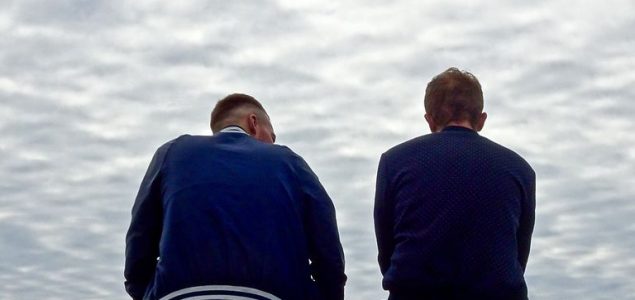My Best Friend
Povezani članci
- POLICE BY INHERITANCE: Successful candidates in competitions as victims of corruption, party and family clans
- Pričam ti priču o dolasku demo(n)kratije
- Srpska, Mostarsko-Banja Lučka, paradigma?
- Western Balkans: Seizing Opportunities, Expanding Influence and Fending Off Dangers
- Svirajte nam, tamburaši
- Ko je bio Alija Kebo?

In the aftermath of the Second World War marbles were a real rarity. I was one amongst a few who had a marble – I was a very lucky kid. Children in my neighborhood, including myself, used to play a marble game with small iron balls pretending that we were playing with marbles. Only on special occasions would I play with my beautiful bright red marble. One day, my friend from the house next door and I were in the middle of the marble game when a boy from a distant neighborhood grabbed my red beauty and said, “This is mine now!” He was a third-grader, more than double my age and much stronger than my friend and I together. Despite his supreme power I struggled to take my marble back, but he just grasped my throat and lifted me up off the ground. I was moving my legs very fast as if I were running through the air. I tried hard to breathe in but without success. Abruptly, my neighbor, who was significantly smaller than I, jumped on the attacker’s back, moved all the way up along his body and snatched his hair with one hand. With the other hand my friend started hitting our poor enemy’s head very fast. The third-grader released my throat and dropped my marble. Then my friend jumped back to the ground and our foe quickly slipped away from our cul-de-sac. “You are my hero! You saved my life!” I shouted and my neighbor just smiled. I took out my bright red marble and put it in his hand saying, “You are my best friend.”
I was about four, four and a quarter to be precise, when I was thinking about who to choose to be my best friend. My neighbor from the house next door, the same age as I, was completely indifferent towards this, for me, very important issue. Everyone wanted to pick and choose a best friend and he said, “I don’t!” Everyone wanted to be someone’s best friend and he said again, “I don’t!” Even that young I knew it’s not enough to just say that one is your best friend – you have to feel it and he has to feel your feelings. Being a best friend is a two-way street. I wanted my stubborn neighbor for my best friend, but how? He kept saying, “I don’t!” But, nobody but him gave me half of his piece of bread sprinkled with olive oil with a bit of red paprika and just a pinch of salt on top. He saw when my piece of bread fell down on the dirt. The other children burst out laughing at what had happened to me, but he silently shared his snack with me. Nobody but him came to my house to play games with me and cherish me when I got a considerable fever and had to spend three long days in a bed. When I lost my last iron ball, nobody but him passed an iron ball to me so that I could continue to play my marble game. For me, that was a very important building block in the course of making a decision about who was supposed to be my best friend. And finally, when he saved my life once, and I told him that he was my best friend and gave him my red beauty, the most wanted marble in the neighborhood, he smiled and said, “You are my best friend too!”
My best friend was a baby look-alike with big green glowing eyes and around, but unattractively pale face. Eager to look older, he talked through clenched teeth most of time. Short and skinny, fragile at first glance, in reality he was an elemental force for the majority of children in the neighborhood when we played a wrestling game. He was faster then lightning and awfully flexible, so it was very difficult to catch him and almost impossible to tighten a grip on him. His brown faded hair was straight by nature and directed toward his forehead. When a few wet bristles sometimes surprisingly sprouted up, I knew that he had spent a minimum of ten minutes brushing his hair in order to achieve a spiky hairstyle. He was energetic, clever and enjoyable to be with. We loved each other very much and most of the time we were together all day long. Many nights, in his or in my house we listened to beautiful goodnight stories. He used to address both his mother and my mother as Mom. I did the same. We were five at the time when one of “our Moms” died. It happened to be his mother. But I was as sad and sorrowful as he was. I told my friend that we, after all, could be happy, because we still had one Mom. And I meant it. “I’m happy,” he whispered. I’ve never heard anyone say something so quietly that sounded so almighty loud – never, ever in my life. With my whole being I felt how deeply broken-hearted he was in his unbearable grief at his mother’s death. My valiant friend didn’t say one word more, but I understood very clearly that he was thinking, “There is only one Mom in one’s life”. I was taught an
important lesson.
At the age of five we decided that we would share my mother, the only Mom we had at the time, until the end of our lives. Many beautiful children’s games, exciting teenage happenings, and grown-up accomplishments have passed – we’ve been best friends for more than forty years, married to beautiful wives and having a bouquet of children. My friend’s two daughters and my three sons had very happy childhoods. Often they would encircle my mother in order to the stories about my friend’s and my exciting infancy. “People are good and life is beautiful,” Mom would say at the end of the story. Not only us, but everyone who ever met her, used to be very fond of her. “Mom, only good things are supposed to happen in the world,” my best friend used to say to my mother whenever he visited with her. I believed that too. But reality was in dispute with our beliefs over the feeling that life is good. A war happened even before we considered that something might possibly go wrong.
The war in Bosnia and Herzegovina completely changed the course of our lives. Happiness was gone in the blink of an eye. Ten thousand people from our city, including my brother, were detained for a long time in concentration camps and more than twenty thousand were forced to leave the city and go to foreign countries. A lot of people were killed, most of the buildings of great historical or artistic value destroyed. Adults became warriors with no mercy and nobody but children cried out for peace. In those days my two sisters with families happened to be moved out from their apartments and displaced to the eastern bank of Neretva River – they became refugees in their own home city. My family was forced to leave the city and we went toward the west to the capital city in the neighboring country, which was one of two aggressors who attacked my country. In this general war chaos, it was a huge surprise for me when I met my best friend’s daughters there. They were trying to proceed to western countries, but without a pile of money that was quite impossible. I felt blessed when I helped them to reach Norway as refugees. My family was constantly under pressure of being repatriated to the central war zone, because we were running out of money and we had no documents at all. Luckily, the U.S. government helped us and my family ended up in the United States of America. When we stepped on American soil on July 21, 1993, I was thinking that life might still be good despite everything that had happened.
In September 1993, I was forty-six years old, forty-six and eight months and seventeen days to be precise, when I was told about my mother’s death. At the age of seventy-two she was shot in the head. The murderers killed her in cold blood. I wished my best friend and I could be together. I had heard nothing of him since the act of aggression on my home country began, yet he was there alone trying to bury our Mom. The war criminals let no one approach my mother’s dead body for five full days. After many attempts my best friend, my sister, and my Mom’s brother succeeded at last in taking my mother’s remains to an improvised graveyard. But, when my best friend wanted to carry out a regular burial, the cold blooded killers’ superior officers decided that he could only dig a shallow hole in the ground, put the ‘dead person’ in there, cover the grave with dirt and sand and leave it unmarked. That was how my best friend prepared and completed our Mom’s burial. For a few years I didn’t know anything about it.
In the aftermath of the worst war ever in Bosnia and Herzegovina, playing a marble game was a real rarity. It was not that there were not enough marbles, but rather not enough children in neighborhoods. Almost half of my home country’s population had become refugees and displaced people during the war. Now they have been coming from all around the globe to visit with relatives and friends or to talk in front of someone’s gravestone as if that very dear person were alive. I went back for another reason – for my mother’s official burial. My best friend, my brother and I were supposed to put our Mom’s remains into a long ago predetermined grave site nearby my father’s grave, right as it was meant to be.
It had been exactly five years since my friend and I had last seen each other. I was quiet when we met again in our home city on the eve of my mother’s second burial. He was happily hugging his two daughters and his wife, but he was as sad and sorrowful as I was. My valiant friend didn’t say a word, but I understood very clearly that he was thinking what I was about to say, “After all, we can be happy, because our children are still alive.” “I’m happy,” he whispered. “Me, too,” I said. I couldn’t agree more. No tears were shed.
“Our Mom can be proud of us.”
Omer A. Mesihovic
Berkeley, October 2005


 ENG
ENG





























